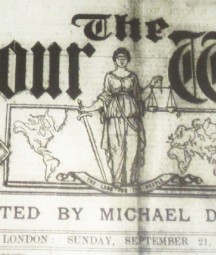Intro by Justin Furlong, NLI Newspaper Librarian
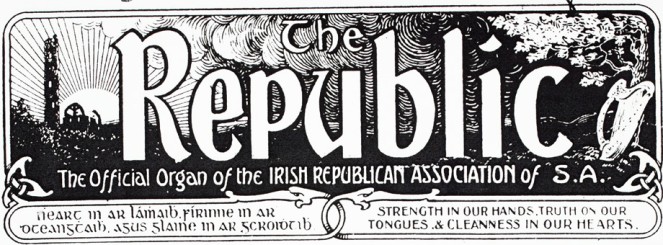
The Republic, the official organ of the Irish Republican Association of South Africa - Strength in our hands, truth on our tongues, & cleanness in our hearts
This is the second in a series of blogs connected to a joint project (Newspaper Descriptors Project) by the National Library of Ireland and the Newspaper & Periodical History Forum of Ireland (NPHFI). The project hopes to provide short descriptors or pen notes for the newspaper titles listed in the Newspaper Database here at the National Library. The descriptors will include such information as publication dates, proprietors and funding, editors and significant journalists, circulation figures (if known), comment on the newspaper’s political affiliation, and mention any histories written on the various titles. The two desciptors below relate to Irish involvement with South Africa: The Republic was the newspaper of the Irish Republican Association of South Africa; the United Irishman was founded shortly after Arthur Griffith returned to Ireland from South Africa having edited the Middelberg Courant there.
We're delighted to present these two pieces on The Republic and the United Irishman by Donal P. McCracken, Senior Professor of History at the University of KwaZulu-Natal, mccrackend@ukzn.ac.za
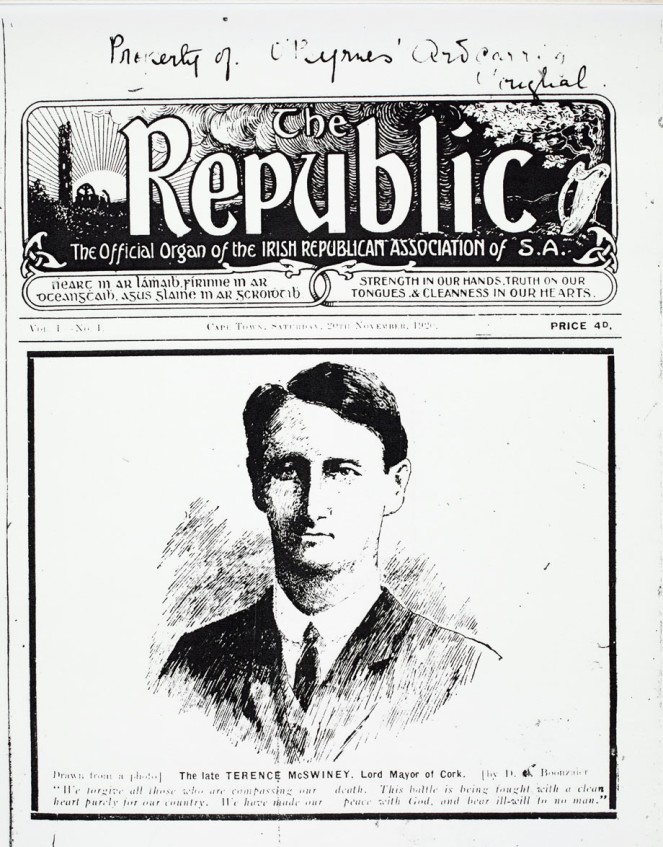
The very first issue of The Republic from Saturday, 20 November 1920
The Republic, 20 November 1920 to 3 June 1922 (41 issues)
Structure: Published and funded by the Irish Republican Association of South Africa; production cost c.£40 per issue; priced at four pence a copy or seven shillings and six pence for annual subscription; normally 16 pages per issue.
Editor: Classics academic and communist intellectual Benjamin Farrington (1891-1974)
Circulation: Over 2000 copies an issue, sold in South Africa and Rhodesia by the Central News Agency (CNA), subscribed by several public libraries, but because of overt anti-British stance was banned from South African Railways platform bookstalls.
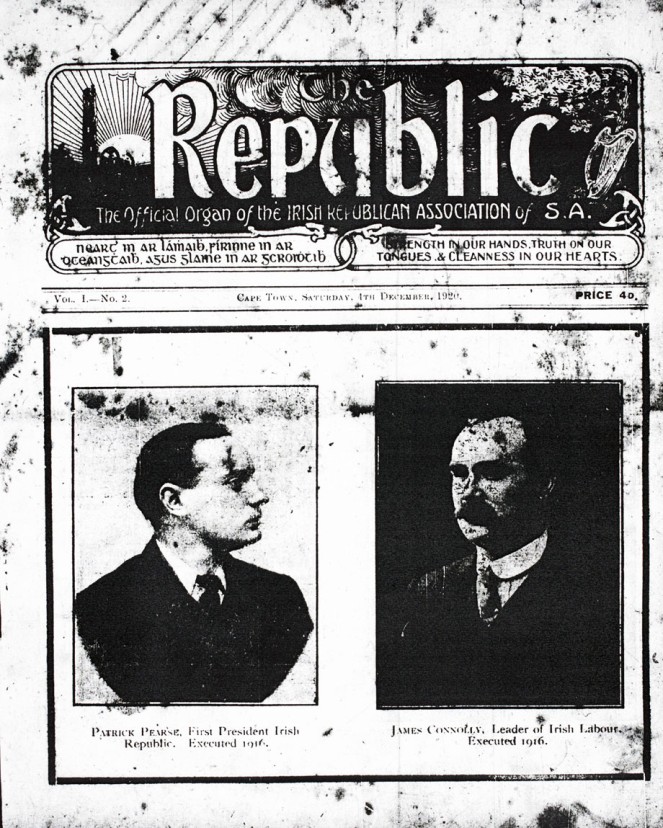
The Republic from Saturday, 4 December 1920
Politics: Like its predecessor, the Cradock-based Irish periodical The Dawn, The Republic was overtly sympathetic towards Sinn Féin. Was described by the Irish Independent as, ‘this lonely propagandist in a new field’; the Weekly Freeman commented that The Republic was ‘an ably written and well arranged paper’. The Republic was operative during the visit to South Africa of Dáil envoys Colonel Maurice Moore and Patrick J. Little and during the Paris-held Irish International, which was attended by the editor. Adversely affected by the 1922 Rand Revolt, The Republic folded amid bitter infighting among the South Africa-Irish over the 1922 Anglo-Irish Treaty. The final editorial, written by Matt Clancy, noted, ‘We must not forget the simple truth that our Association has been a very great success, one without precedent in the history of Irish Afrikanderdom’.
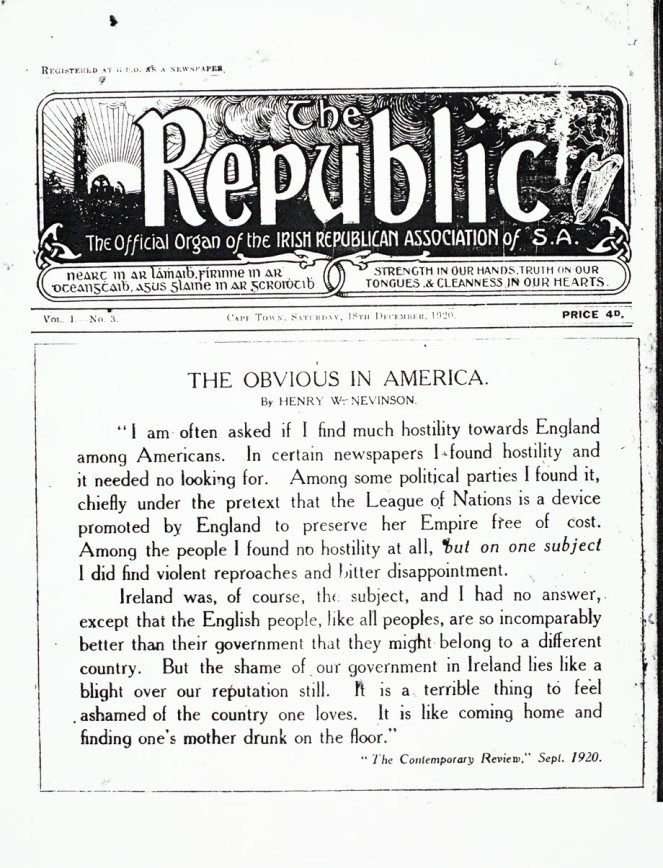
The Republic from Saturday, 18 December 1920
Histories:
T.K. Daniel, ‘The scholars and the saboteurs: The wrecking of a South African Irish scheme, Paris 1922’, Southern African-Irish Studies, volume 1, pp.162-175
Donal P. McCracken, ‘The Irish Republican Association of South Africa’, in Ireland and South Africa in Modern Times, as volume 3 of Southern African-Irish Studies, 1996, pp.46-66
A book of 41 extracts from The Republic was published in Cape Town in March 1922 under the imprint of the IRASA and printed by Nasionale Pers as The Irish in South Africa, 1920-1.
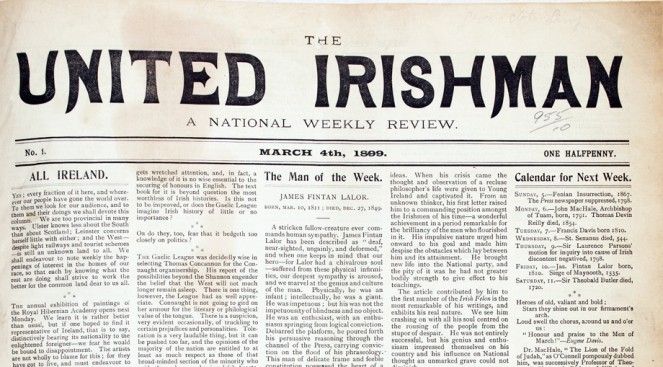
First ever issue of The United Irishman from Saturday, 4 March 1899 which set you back the princely sum of One Halfpenny
United Irishman, 4 March 1899 to 14 April 1906
Suggested by Mark Ryan and Art O’Brien, replaced the Shan Van Vocht, and was founded as the South African crisis worsened, shortly after Griffith returned from working in that region having edited the Middelberg Courant. The United Irishman folded consequential to a libel case brought by a County Limerick parish priest.
Structure: Board of directors. Printed by Bernard Doyle. Funding irregular; dependent on sponsorship from Mark Ryan (initially using covert Boer government money) and 25 shillings a week from Maud Gonne. Newspaper office, a ‘dirty little hole’, was in Fownes Street, Temple Bar, Dublin.
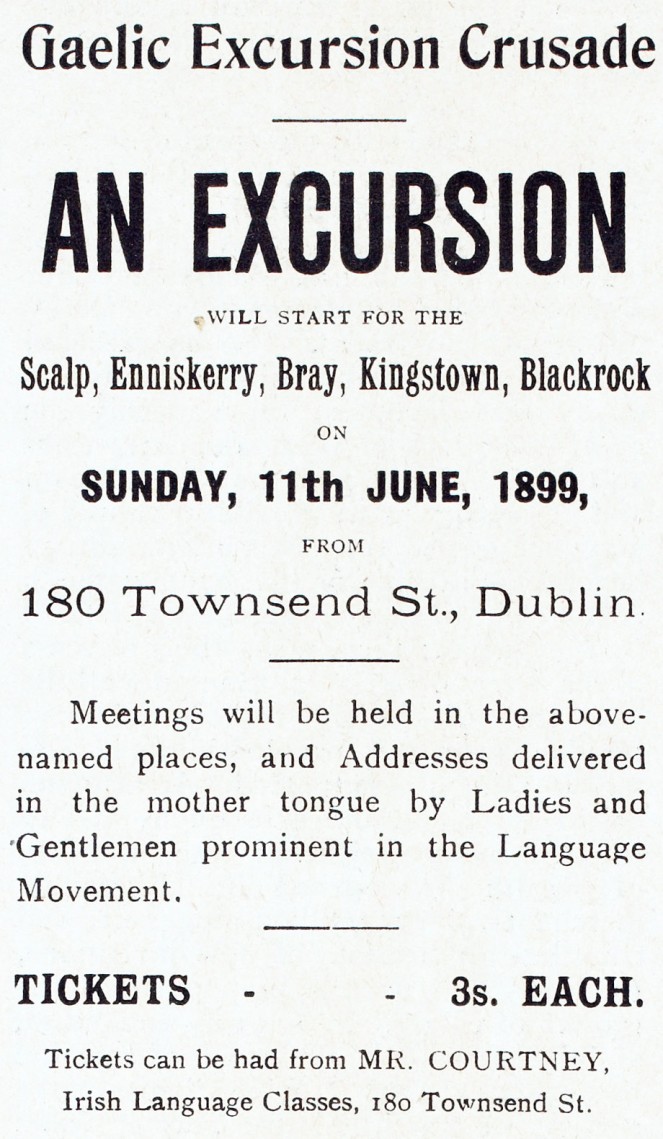
Advertisement for a Gaelic Excursion Crusade from The United Irishman, 1899
Editorial: Edited by Arthur Griffith (4 March 1899 to 14 April 1906), greatly assisted by William Rooney (March 1899 to May 1901) and inspired by John Mitchel. Relied on a host of intellectual advanced nationalists and poets providing free copy, including A.E. (George Russell), William Bulfin, Joseph Campbell, Padraic Colum, James Connolly, Frank Fay, Oliver St. John Gogarty, Maud Gonne, John O’Leary, George Moore, P.S. O’Hegarty, The O’Rahilly, Padraig Pearse, Fred Ryan, Seamus O’Sullivan, Katharine Tynan and J.B. and W.B. Yeats. This provided an unusually wide diversity of topics and themes. Much of the paper was authored by Griffith, who lived in penury to keep the paper operative.
Circulation: Unknown. Eason's, Ireland’s premier newsagents, quoted sales in October 1899 as 500 a week, half from railway platform kiosks. When an edition was suppressed in September 1900, the police seized 1293 copies. Circulation likely increased in the Edwardian period.
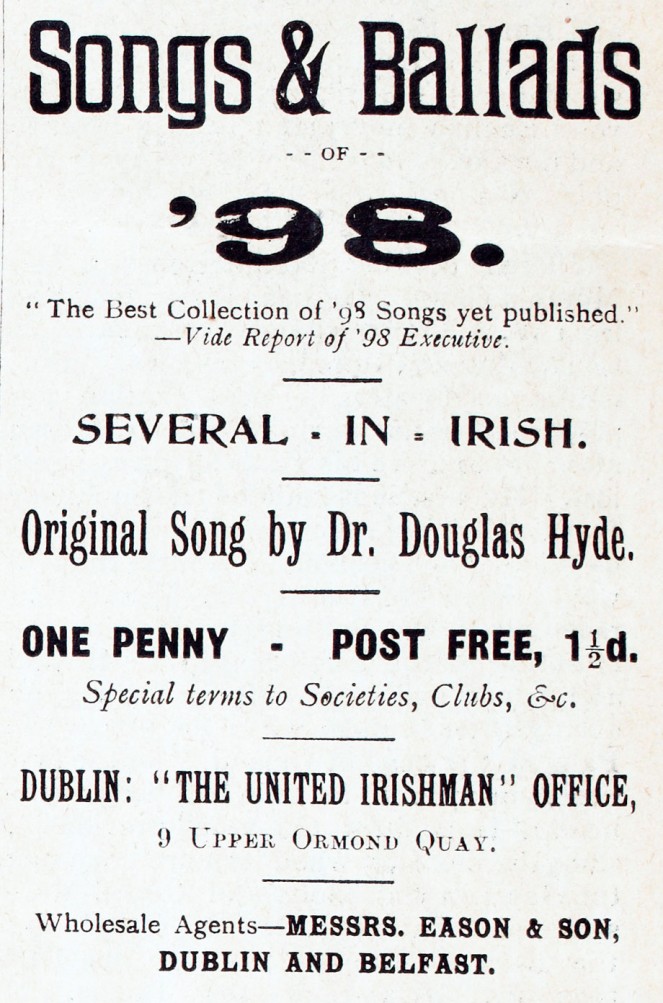
Advertisement for Songs and Ballads of '98, including an Original Song by Dr. Douglas Hyde, from The United Irishman, 1899
Politics: Advanced nationalist. Initially pro-Boer (1899-1902); strongly anti-Parliamentary Party; increasingly ‘Irish-Ireland’ stance; pragmatically anti-physical force; pro-women’s rights; anti-imperial and sometimes anti-Semitic, yet in Irish context non-sectarian and non-racial, not distinguishing between ‘Irishmen of fifty generations against Irishmen of five’. The newspaper first published Griffith’s ‘Resurrection of Hungary’ (21 January to 2 July 1904) and operative in 1905 when Sinn Féin founded. Issues frequently suppressed by police, though paper never banned.
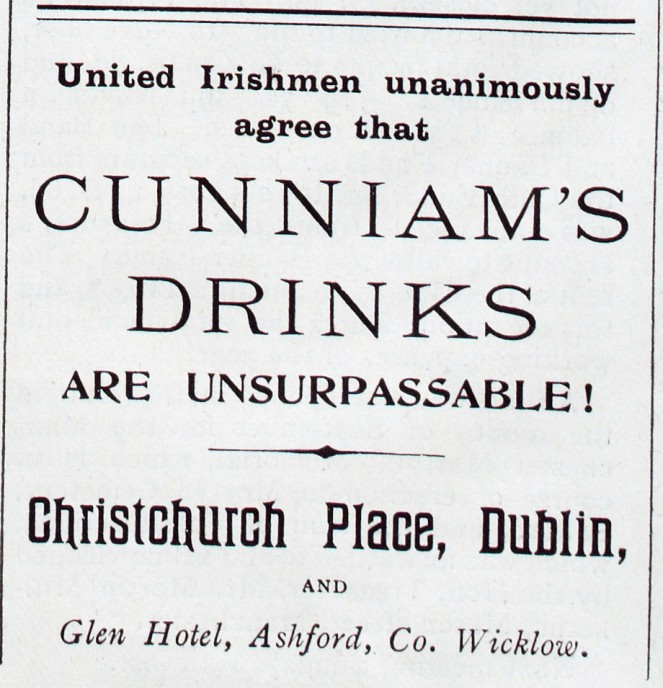
Something on which United Irishmen could unanimously agree - Cunniam's Drinks are unsurpassable!
Histories:
Entries on Griffith: Dictionary of Irish Biography (Michael Laffin) and Oxford Dictionary of National Biography (Charles Townshend)
Brian Maye, Arthur Griffith, 1997
Seán Ó Lúing, Art Ó Gríofa, 1953

